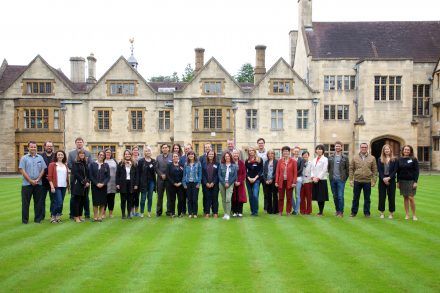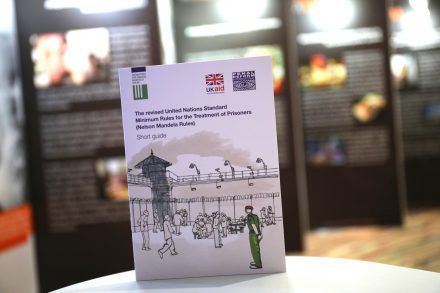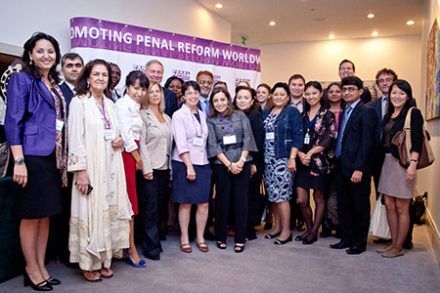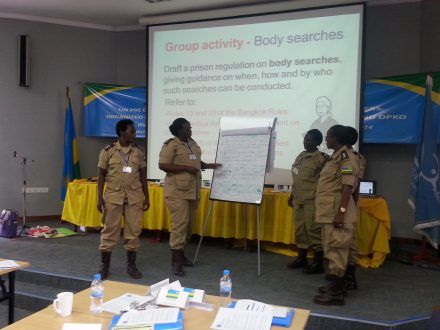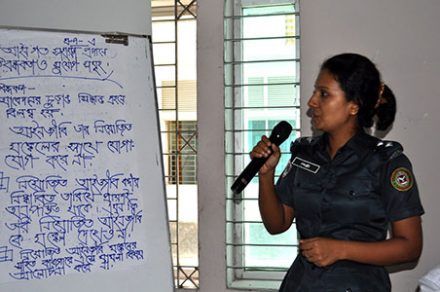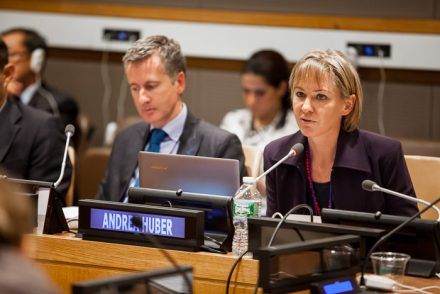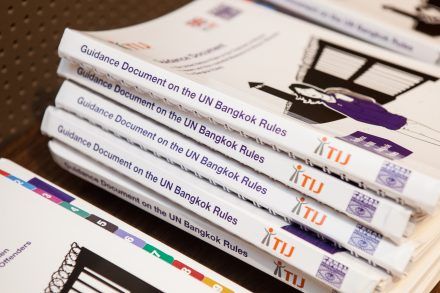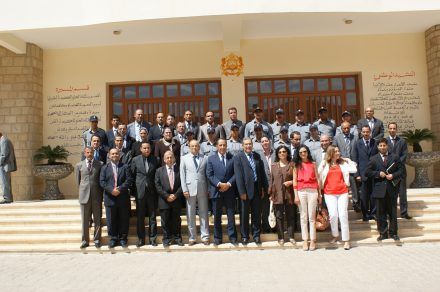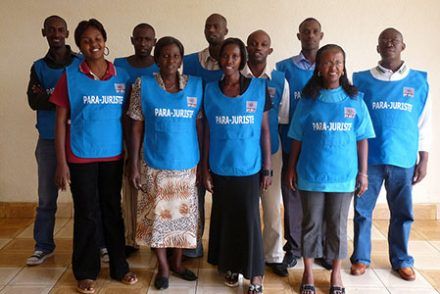Since 1989, PRI has been working in the field of criminal justice and penal reform at national, regional and international levels. Explore the timeline below for highlights from our work. Over the years, we have had many successes, working in more than 90 countries. We are proud of our past achievements and look forward to the years ahead.
PRI was one of the first criminal justice NGOs to respond to the COVID-19 pandemic hitting prisons and issued two briefing papers examining the human rights implications of measures take by prison authorities and criminal justice settings to stem the spread of the virus. Both papers issued recommendations for urgent response and longer-term systemic reform. We also delivered practical support to prisons throughout the pandemic, working in Jordan, Algeria, Kazakhstan, Central African Republic and Uganda including the provision of personal protective equipment, training for prison staff on preventing the spread of the virus, development of public health information leaflets, development of communications channels for families of people in detention, and advocating for the release of people to reduce overcrowding and populations. We were consulted by the OHCHR on a statement from the UN High Commissioner for Human Rights, Michelle Bachelet. The High Commissioner highlighted the dire need for urgent action to protect ‘catastrophic’ consequences for persons in detention, citing dangerous levels of overcrowding, unhygienic conditions and inadequate or non-existent health services. Notably she called for releases, following our recommendations among others. We relaunched our Europe Programme in part thanks to being awarded a grant by the European Commission Directorate for Justice (DG Just) for a project on promoting alternatives to imprisonment across Europe with a particular focus on vulnerable and minority groups. We marked the 10th Anniversary of the UN Bangkok Rules through a series of events and activities including a blog series. We published new analysis which showed an increase of over 100,000 (17 per cent) in the global female prison population with dramatic increases in many regions since the Bangkok Rules were adopted. PRI also coordinated a group of 12 UN and regional human rights experts, including the UN High Commissioner for Human Rights, to issue a call for governments across the world to fully implement the Rules. Over 80 civil society organisations also issued a Joint Call to Action, coordinated by PRI, calling for a reduction in the imprisonment of women and improved protection of their rights in criminal justice systems.
In 2019 we celebrated our 30th anniversary and launched a new four year strategy 2020-2023. In Central African Republic we were instrumental in the development and adoption of the National Demilitarisation Strategy of the Penitentiary System in Central African Republic which seeks reform of the country’s prison system and full civilian management. In Georgia, we reactivated a network of civil society organisations called the Alliance for Penal and Probation Reforms in Georgia to coordinate policy and advocacy responses to government planned reforms of the criminal justice system. In Uganda we launched the Practice Guide for defense lawyers representing individuals facing the death penalty as well as a research study on the application of international fair trial standards in death penalty cases ; We gained high-level support from the Assistant Secretary General and UN Office of the High Commissioner for Human Rights level on the use of life imprisonment. Our advocacy led to the inclusion of commentary on life sentences in the report of the UN High Commissioner for Human Rights on death and serious injury of persons deprived of liberty. Subsequently, due to traction gained with Austria, who led on the UN Human Rights Council resolution on administration of justice, we were able to link overincarceration and prison overcrowding with life imprisonment sentences and issue recommendations.
In Morocco, we launch the first prison radio in the Middle East and North Africa region in the Morocco’s biggest prison Oukasha in Casablanca. The radio, modelled on similar prison radio programmes around the world, gives prisoners a recreational activity as well as a training opportunity for inmates, a platform to discuss important issues related to the prison and an opportunity for contact with family. In Kyrgyzstan, we support the creation of a police station to pilot the use of investigative interviewing as a solution to preventing the use of torture. In Georgia we provide 680 women offenders, former offenders and their children with access to services including legal aid, psychological counselling, training and work opportunities, all of which aim to support their rehabilitation and reintegration back into society. We launch a project in Central African Republic to develop a strategy to demilitarise the country’s prison system. The strategy is endorsed by the Prime Minister of the Central African Republic, Simplice Sarandji We launch a new global campaign to tackle the use of life imprisonment, specifically life without parole, with the aim to understand its use and its impact on the human rights of those serving these sentences. We publish a number of significant publications including the 4th edition of our flagship publication Global Prison Trends. Together with the OSCE, we publish the Guidance Document on the Nelson Mandela Rules. The publication provides guidance for managers and staff of penal institutions on the interpretation and effective implementation of the revised rules. We also publish a guide for prison staff on how to deal with prisoners with mental health issues and a factsheet on prison conditions for women facing the death penalty.
We successfully complete our Kenya project, implemented with the Kenya Probation and Aftercare Service, to develop gender-sensitive pre-sentence reports and community service placements for women offenders. Resources produced include an internationally replicable, 10-step Model for Reform. Other publications include the third edition of our Global Prison Trends series, and Children and violent extremism, a briefing outlining the international and regional standards regarding the care and treatment of children suspected, or convicted, of violent extremist-related offences. The work of our regional offices – which ranges from combatting corruption in places of detention in Kazakhstan to bringing the law regulating the work of the National Preventive Mechanism in Armenia in line with international standards – continues to have a wide impact. Our Africa office, based in Uganda, delivers its first project, providing training to prison officers on vulnerable groups of prisoners. The difficult decision to close the Moscow regional office is made; a combination of political and financial factors means that the office is no longer financially viable. PRI holds its second Summer School, equipping participants from 20 countries with the necessary technical knowledge to apply the UN Nelson Mandela Rules to the monitoring of detention facilities.
We continue to promote the Nelson Mandela Rules. In collaboration with the UK government, PRI publishes a Short Guide to the Nelson Mandela Rules, which is now available in eight languages. PRI and the University of Essex’s Human Rights Centre publish a guidance document on the interpretation and implementation of the Rules. A pilot project with partner Kenya Probation Service is implemented to develop a gender-sensitive approach to the delivery of community sanctions. The subsequent research report is launched in October, and a short film is produced to highlight the benefits and challenges experienced by women serving community sentences. Our publications in 2016 include the second edition of our Global Prison Trends series, as well as a 10-point plan to reform criminal justice responses to drugs. PRI establishes a pilot office in Kampala, Uganda, to explore the potential for sustainable funding for penitentiary reform.
In 2015, the UN General Assembly unanimously adopts the revised UN Standard Minimum Rules, renaming them the Nelson Mandela Rules. This was the culmination of four years of intensive advocacy by PRI and other organisations to bring the 60-year-old Rules up-to-date with modern human rights standards. We publish several influential reports, including Global Prison Trends 2015 – a unique and comprehensive overview of global penal policy and practice, and Sharia law and the death penalty. We also host our first event on addressing radicalisation in prisons, bringing together experts from 15 countries. Elsewhere, we continue to work with a wide range of partners in government and civil society to develop and strengthen probation services, build child-friendly justice systems and reduce the damaging incarceration of women offenders.
PRI celebrates its 25th anniversary this year, launching a new short animated film – Is a prison sentence always the solution? PRI’s work on the UN Bangkok Rules continues with a focus on training. Over 300 individuals from over 60 countries take part in face-to-face training and our e-learning course. The revision of the UN Standard Minimum Rules moves closer to completion. In our regions, work with governments over a number of years pays off with a new Children’s Act in Jordan introducing improvements for children in conflict with the law, and in Kazakhstan, with revised criminal codes. In East Africa, we launch a new project to expand community service in Kenya, Tanzania and Uganda.
PRI launches three flagship publications: a Toolbox on the UN Bangkok Rules, including PRI’s first free e-learning course; a Detention Monitoring Tool to help monitoring bodies to detect and prevent torture; and a brand new edition of our popular Juvenile Justice Manual. Reducing unnecessary imprisonment remains at the heart of what we do. An OSF-funded project in Georgia concludes this year, with statistics now showing greater use and awareness of community service. In East Africa we take the first steps to establish a pan-African Network on Probation and Community Service. PRI also continues work to protect the rights of children in conflict and in contact with the law, pushing for greater recognition of their needs and engaging in practical projects to establish child-friendly justice systems.
PRI continues its work to promote the UN Bangkok Rules and the newly adopted UN Principles and Guidelines on Access to Legal Aid in Criminal Justice Systems, as well as updating the UN Standard Minimum Rules for the Treatment of Prisoners. We organise a cross-regional conference on torture prevention in Tbilisi, Georgia as well as an international conference on violence against children in detention with UNICEF in Kyrgyzstan. Both are streamed live via webcast. PRI receives Observer Status with the Inter-Parliamentary Union and the African Committee of Experts on the Rights and Welfare of the Child.
Work begins with partners in East Africa and South Asia. PRI hosts three film festivals in Jordan, Kazakhstan and Georgia on the abolition of the death penalty and life imprisonment. PRI”s Middle East and North Africa office completes its six-year juvenile justice programme funded by SIDA. PRI updates its Ten-point plan to address prison overcrowding and Ten-point plan for fair and effective criminal justice for children, both now available on the website for use as campaigning and information tools.
The United Nations Rules for the Treatment of Women Prisoners and Non-Custodial Measures for Women Offenders (the Bangkok Rules) are adopted. PRI advocated intensively for their adoption and continues to promote their implementation. PRI’s approach to making societies safer is set out in Making Law and Policy that Work, which is launched at the UN Crime Congress in April 2010. PRI helps draft proposed new guidelines for legal aid in criminal cases at meetings organised by the UN Office for Drugs and Crime. In 2010, PRI’s regional offices are based in Russia, Kazakhstan, Georgia, Jordan and Rwanda. At the end of December the office in the Great Lakes region of Africa is closed, following a decision to work in Africa through local partnerships.
PRI launches Africa’s Recommendations for Penal Reform at the ACHPR, encouraging states and NGOs in Africa to implement previously agreed action plans and proposals.
Strategies for protecting pre-trial detainees’ rights and reducing prison overcrowding are implemented in Rwanda, Burundi, Central Asia and the South Caucasus. The UN ECOSOC adopts a resolution reflecting the Lilongwe Declaration on legal aid and the PRI / UNICEF juvenile justice manual is published and translated into Arabic.
PRI and the international penal reform community mourn the loss of Ahmed Othmani, one of the founders of PRI. Ahmed Othmani made an enormous contribution and, as a former political prisoner, had been an inspirational leader under whose chairmanship PRI grew into an internationally recognised expert reform body, with 12 offices and over 100 members of staff. In Malawi, over 21 African countries gather to discuss and promote legal aid services in the criminal justice system and the Lilongwe Declaration on legal aid is adopted.
In the Caribbean, the death penalty project wins the right to free legal assistance for over 60 prisoners under sentence of death. Take a look at our work on the death penalty.
In Malawi, the work of the Paralegal Advisory Service leads to a decrease in pre-trial detention, as prisoners are empowered to represent themselves and obtain bail, and juveniles held in police custody are diverted from prison.
After 10 years of work, PRI gathers delegates from 52 countries to discuss the challenges for penal reform and to formulate a strategy for overcoming them. PRI works with African heads of correctional services to develop the Arusha Declaration on Good Prison Practice, including improving management, involvement of civil society and dynamic security. This is endorsed in a UN ECOSOC Resolution calling for new approaches in criminal justice sanctions.
